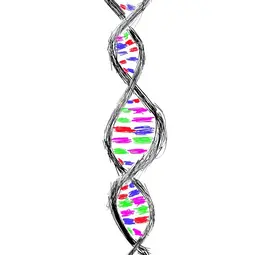Tumorigenesis and Molecular Cancer Prevention
- DKFZ Hector Cancer Institute
- Epidemiology, Public Health, Prevention and Survivorship
- Junior Research Group

Dr. Karol Nowicki-Osuch
Group Leader
Tiny changes barely altering healthy homeostasis of normal epithelium are the earliest stages of solid tumor development. Our group leverages a multitude of multimodal techniques to study the minute dysregulations of the healthy gastrointestinal tissue that underlie the development of poor prognosis cancers. We believe that a better understanding of cancer initiation will result in novel cancer interception strategies and ultimately, improved outcomes for patients globally.

Our Research
Gastric and oesophageal tumours are, jointly, the second most common cause of cancer death globally. The poor survival (approx. 15% 5-year survival) of patients diagnosed with these tumour types stems from the frequent late diagnosis. However, the early diagnosis of these tumours dramatically increases patients’ 5-year survival to over 75%. Our ability to detect early stages of gastric and oesophageal cancers is limited by our understanding of how these cancers develop. For decades, we have known that these cancers develop via precancerous lesions called Barrett’s Oesophagus and Gastric Intestinal Metaplasia. However, despite decades of clinical knowledge our molecular understanding of precancerous lesion and their relationship with cancer and, importantly, normal tissues they originate from is limited. The Tumorigenesis and Molecular Cancer Prevention Research Group uses state-of-art approaches to characterize and model early transcriptional, genetic and epigenetic processes that drive the development of gastro-oesophageal tumours and their precancerous lesions. A critical part of our work is to understanding how normal cells of the stomach and oesophagus lose their molecular identity and slowly transform into (pre)cancerous states. Using single-cell RNA sequencing, we demonstrated that, despite its name, Oesophageal Adenocarcinoma, a subtype of Oesophageal Cancer, originates from the stomach. It is also molecularly indistinguishable from other gastric cancers. Our work has also shown that the precancerous lesions have unique molecular properties that can only be described as single-cell molecular mosaicism – a state in which cells can stably maintain a mixed phenotype that is normally observed in two different cell types of the human body.
Directions
Our previous work demonstrated that the state-of-art single-cell sequencing approaches could accurately predict cell-of-origin as well as transcriptional and epigenetic make of (pre)cancerous lesions. In the next stage of our research, we aim to use our existing expertise, approaches, and newly obtained knowledge about the molecular features of developing cancers to answer two questions:
- Can we model the earliest stages of gastro-oesophageal tumour development using in vivo and in vitro models?
- Can we use our detailed understanding of the changes that occur along the developmental trajectory of gastro-oesophageal cancers to improve patient’ survival through early cancer detection?
We tackle these questions by:
- Developing new organoid models of healthy and disease states and testing how genetic and epigenetic factors alter cellular behaviour;
- Using novel sequencing approaches (multimodal single cell assays and the newly developed mutREAD) to define minute differences between healthy and disease states;
- Developing novel computational approaches to data processing, analysis and visualisation;
- Implement of our technologies, early detection approaches and knowledge into clinically applicable settings in collaboration with clinical partners in Germany, Poland, the UK and the US.
Projects
Genotype-phenotype map of intestinal metaplasia
Intestinal metaplasia of the esophagus and stomach are a known precancerous lesion, yet there remains a gap of knowledge as to the transition from normal metaplasia to carcinoma. Individual crypts in these tissue are comprised of the progeny of individual stem cell niches in each crypt. This results in a highly poly clonal tissue, with a mutational burden similar to that of early cancers. Through a combination of novel targeted NGS, proteomics, and high throughput imaging, we aim to create a comprehensive map of the clonal behavior of crypts, and subsequently develop early detection and interception strategies for this condition.
Additionally, we use spatial transcriptomics trained on our single-cell RNA-seq-derived transcriptional atlas of the GE tract to investigate phenotypic diversity. The outcome of this work package will demonstrate for the first time the clonal relationship between cells of the stomach and the mutational processes shaping somatic evolution. It will further allow for investigation of the timing of genetic events preceding GE cancer development and for the first time will demonstrate the spatiotemporal interaction of genome and transcriptome shaping the development of GE cancers.
3D cell culture system for studying tumorigenesis
We develop advanced 3D in vitro models of healthy, IM, and cancer tissues, and using CRISPR approaches to evaluate the role epigenetic and genetic cell-intrinsic factors play in the development of these cancers.
Implementation of advanced 3D culture (organoid, cleared tissue scaffolds, organ chip) systems to grow healthy and precancerous organoids derived from human tissue samples provided by our clinical collaborators, and GE cancer organoids generously provided my Mark Foundation are used to perform a detailed assessment of the similarity of these models with our existing single-cell RNA-seq-derived phenotypic assessment of human cell states. Further, we aim to investigate the temporal sequence between IM and the accumulation of mutations that lead to gastro-oesophageal cancers by inducing IM first with the epigenetic drivers (HNF4A, CDX2, c-MYC) and then inducing the genetic mutations such as TP53 and CDKN2A.
The outcome of this work package will provide the most comprehensive set of in vitro models of early GE cancer development and will demonstrate whether the order of events preceding GE cancer development plays a critical role in the frequency and risk of cancer development.
Team
-

Dr. Karol Nowicki-Osuch
Group Leader
-

Dr. Katharina Bosch
Postdoctoral Researcher
-

Zhenbang Chen
PhD Candidate
-

Minghui Jiang
PhD Candidate
- Show profile

Francisco Javier Rios Sola
PhD Candidate
-

Maren Scheidle
Research Technician
-

Aileen Geobee Uy
PhD Candidate
- Show profile

Andrew Wicks
PhD Candidate
Selected Publications
Nowicki-Osuch K, Zhuang L, Cheung TS, et al.
Nowicki-Osuch K, Zhuang L, Jammula S, et al.
Perner, J., Abbas, S., Nowicki-Osuch, K. et al.
Lian, G., Malagola, E., Wei, C., Shi, Q., Zhao, J., Hata, M., Kobayashi, H., Ochiai, Y., Zheng, B., Zhi, X., Wu, F., Tu, R., Nápoles, O. C., Su, W., Li, L., Jing, C., Chen, M., Zamechek, L., Friedman, R., Nowicki-Osuch, K., Wang, T. C., et al.
Ng, A. W. T., Oesophageal Cancer Clinical and Molecular Stratification (OCCAMS) Consortium, Nowicki-Osuch, K., & Fitzgerald, R. C. et al.
Get in touch with us
